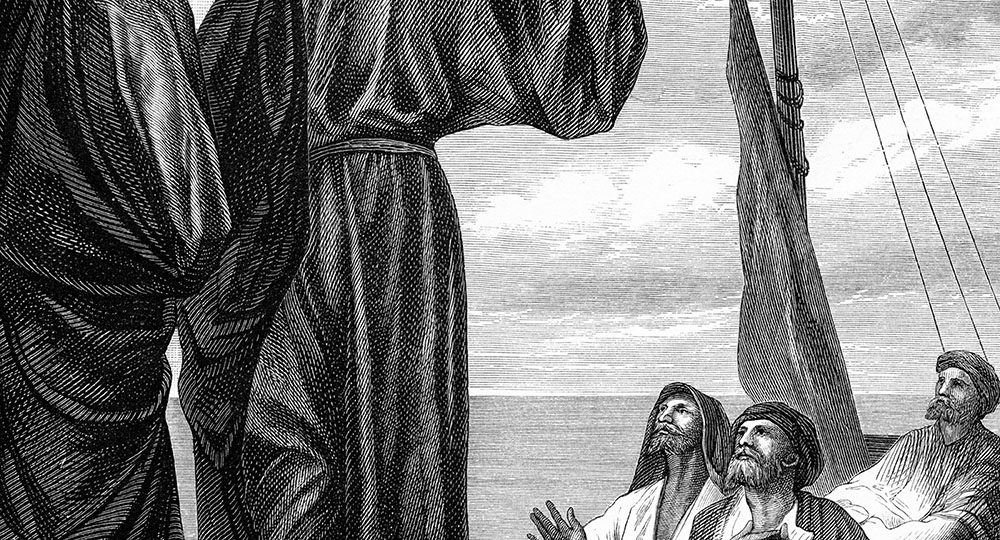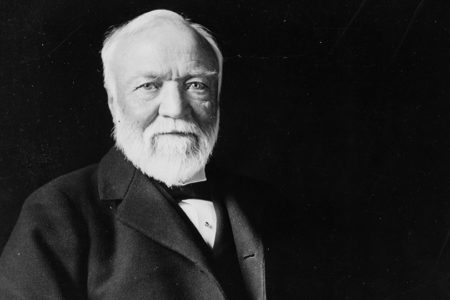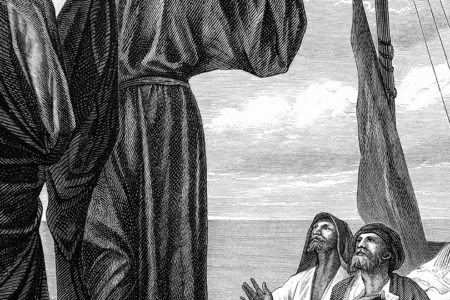Redefining the Gospel
A look at the true Good News and how it’s being turned into different news today
When our children were young, my wife and I would take them every October 31 to the storage shed behind our house. They each brought a sheet of paper on which they had written a simple sentence thanking God for something: “Thank you, God, for the Bible,” or “Thank you, God, for salvation.”
Inside the shed, we gave them a hammer, and they nailed their papers to the wall. By the time they were teenagers, many yellowed, curled, and dusty pages adorned the shed wall.
Why did we do it? Because on October 31, 1517, Martin Luther nailed his 95 theses to the church door at Wittenberg, Germany, sparking the Protestant Reformation. Luther’s action unfurled a chain of events that realigned many people’s understanding of the gospel with biblical truth. Namely, we are saved from our sins by grace alone, through faith alone, in Jesus Christ alone, according to the Scriptures alone—and not by good deeds or religious traditions.
We had our children reenact Luther’s act so they would remember the event’s significance and how it continues to impact our lives today.
But not all professing Christians today remember. A 2017 Pew Research Center survey, conducted in conjunction with the 500th anniversary of the start of the Reformation, found that “most Christians in the U.S. (62%) say that both faith in God and good deeds are necessary to get into heaven.”1 The same is true in Western Europe. According to the survey, “In every country except Norway…belief in sola fide [Latin for “faith alone”] is a minority view even among Protestants.”2
Redefining the gospel is nothing new. (See Galatians 1:6–7.) People have always been tempted to infuse it with new meaning and structure it into something other than the gospel in the Bible.
Other Gospels
Here is a sampling of what is being preached today that deviates from Scripture:
Law-Keeping Gospel. The New Testament books of Acts and Galatians debunk the notion that people need to be circumcised and keep the Law of Moses to be saved. Recognizing the importance of this issue and the centrality of the gospel to the Christian faith, a council of church leaders convened in Jerusalem to discuss the matter. After much debate, the apostle Peter stood up and made the case for the gospel of grace (Acts 15:8–11). The council subsequently decided that keeping the Law was not a part of the gospel. We are saved by faith, not by works.
Lordship Salvation Gospel. Proponents of lordship salvation insist we must submit to Jesus as Lord or Master of our lives prior to, or as part of, believing the gospel in order to be saved. Their concern is that people will profess faith in Christ and then live however they want.
The problem with lordship salvation, however, is that it contradicts the fact that faith is the only condition for salvation (2 Tim. 3:15). Some try to circumvent this issue by redefining faith to include an act of submission. But doing so confuses the essence of genuine faith (an internal assurance and conviction of things hoped for and unseen; Heb. 11:1) with the evidence of genuine faith (our external works; cf. Jas. 2:18).
If, as the lordship-salvation gospel proposes, we had to submit completely to Christ’s lordship in order to be saved, how would we know if we had submitted enough? We wouldn’t. Thus lordship salvation moves perilously close to becoming a gospel of works, contradicting a gospel of grace (Eph. 2:8–9).
Prosperity Gospel. This gospel claims God does not want anyone to be sick, poor, or troubled. Come to Jesus; and you will be healthy, wealthy, and problem-free. Certain televangelists promote the prosperity gospel.
However, the Bible does not promise us physical and material blessings. Instead, we are promised every spiritual blessing in the heavenly places in Christ (1:3), as well as the certainty that we will suffer tribulation and persecution in this world if we live godly in Christ Jesus (Jn. 16:33; 2 Tim. 3:12). The apostle Paul’s life was proof of that fact. (See 2 Corinthians 11:23–28.)
Self-Esteem Gospel. This gospel actually repackages Norman Vincent Peale’s popular positive-thinking philosophy. Peale’s 1952 book, The Power of Positive Thinking, so captivated America that it held a spot on the best-seller list for 186 consecutive weeks. Proclaimers of this gospel focus on being all you can be, becoming your best self; and if you can think it, you can make it happen.
The problem with this philosophy is that it either downplays or completely ignores humanity’s central problem: sin. We need salvation because we are sinners by nature and choice; and the wages of sin is death, both temporal and eternal (Rom. 3:23; 6:23). The cold, hard fact is that we cannot become better. That’s why we need a Savior.
Social-Justice Gospel. Like the self-esteem gospel, the social-justice gospel also repackages error. Today’s movement is a retread of the social-gospel movement of the late 19th and early 20th centuries and emphasizes changing the world by ending poverty, challenging injustices, and bringing equality to the oppressed in the hopes of creating a social revolution that ultimately will bring the Kingdom of God to Earth (a new form of Postmillennialism).
A vanguard in this movement was the 2009 book by Richard Stearns, president of World Vision U.S., titled The Hole in Our Gospel: What Does God Expect of Us? The book postulates that if we do not publicly fight for the poor and for justice and equality, we are not demonstrating the whole gospel. However, the problem with the social-justice gospel is twofold:
First, it confuses means with message. Even though as Christians we are to do good deeds, doing good deeds is not the gospel. No one ever got saved by observing good deeds. The true gospel is a message disseminated through proclamation (1 Cor. 1:21; cf. Rom. 10:13–15; Gal. 3:2). Meeting people’s physical needs is a means to the gospel, and a good means. But we cannot make it a necessary component of the gospel. Godly means for the gospel must be distinguished from the message of the gospel. (See 1 Corinthians 9:19–23.)
From its inception in 1938, The Friends of Israel Gospel Ministry has helped refugees, the poor, and the downtrodden; and this work continues today. (Visit our website, foi.org, to view our online gift catalog and see how we provide aid and relief around the world.) But The Friends of Israel also has acknowledged from its beginning that life is fleeting and involves more than the temporal. The most important way to help people is to bring them the good news of eternal life.
Second, the social-justice gospel doesn’t keep first things first. The Great Commission Jesus gave the church says nothing about eradicating poverty, resolving every injustice, or bringing equality to all. It does not even mention bringing God’s Kingdom to Earth (only Christ can and will do that at His Second Coming). The Great Commission is to “make disciples” of Jesus Christ throughout the world by proclaiming the gospel, baptizing those who believe, and teaching them to observe all that Jesus commanded (Mt. 28:19–20).
GOSPEL RESET
Study the truth of the gospel in depth and how to share it with others in Gospel Reset by Ken Ham.
As much as God loves the poor, they do not always take priority. Even Jesus said, “For you have the poor with you always, but Me you do not have always” (26:11). When an angel of the Lord appeared to Joseph in a dream, he did not tell Joseph to call Mary’s son Jesus because He will save people from poverty, injustice, and social inequality. Rather, he told him, “Call His name JESUS, for He will save His people from their sins” (1:21).
It is important to remember that the world’s greatest problem is sin, not poverty; and the greatest solution is spiritual salvation, not social revolution. This is why the apostle Paul said the gospel—and nothing else—is of first importance (1 Cor. 15:3).
What Is the Gospel?
The term gospel means “good news.” It is a message eternally profound, yet so simple even a child can understand and believe it. Based on its central elements as outlined in 1 Corinthians 15:1–11, here is a straightforward presentation of God’s amazing gospel of salvation:
- We all are sinners (Isa. 64:6; Rom. 3:10, 23).
- The penalty for sin is death (Ezek. 18:20; Rom. 5:12; 6:23).
- Only blood can atone for sin (Lev. 17:11).
- Jesus Christ shed His blood and died in our place (Isa. 53:1–12; Rom. 5:8).3
- Jesus Christ was raised from the dead (Ps. 16:10; Isa. 53:12; Acts 13:30; Rom. 5:10).4
If you believe Jesus Christ did all these things and that there is no way you can remove your sin other than through faith in Him, you will be saved, meaning, you will receive forgiveness of sin and the gift of eternal life (Acts 10:43; 16:31; Rom. 6:23).
Our children are grown now, and we have grandchildren. But whenever I’m in the shed, I take the time to look at the papers hanging on the wall and whisper a prayer of my own, thanking God for His wonderful and simple gospel of grace.
ENDNOTES
- “U.S. Protestants Are Not Defined by Reformation-Era Controversies 500 Years Later,” Pew Research Center, August 31, 2017 <goo.gl/5sa2Ar>.
- “After 500 Years, Reformation-Era Divisions Have Lost Much of Their Potency,” Pew Research Center, August 31, 2017 <goo.gl/w38HFW>.
- The proof being He was buried (1 Cor. 15:4).
- The proof being He was seen by more than 500 people (1 Cor. 15:5–8).








I sure appreciate the clear gospel presentation. So many teachers throw in “repent of your sins”. I need your help. Someone gave me an “After the Tribulation ” documentary, put out by Framing the World and i don’t know how to refute it.
I find it interesting that this article is about redefining the gospel and yet under the heading “What is the Gospel” there is no mention of repentance. Satan and his minions believe the facts of the gospel, and they tremble; of course they have no faith and have not repented. This type of “salvation” at the end of the article is what I grew up with in church. I was an adult before realizing I needed to repent of my sin-biblical definition being a change of mind that leads to a change in direction. When we repent and have faith in what Jesus did for us on the cross, He makes us a new creature, He gives us a new heart, one that no longer is enslaved to sin, but enslaved to righteousness (Rom 6). One that wants to obey Him. We are not saved by works, but true saving faith produces works; faith without works is dead (James 2:14-26). For the record, repentance is not a work we do either, it is granted to us by God. 2Tim. 2:25; Acts 11:18; 2 Cor. 7:9-10
Apparently there are different definitions of “Lordship salvation” too. But if Jesus is not your Lord, He is not your Savior either. 1 John 2:3-6
I too find this bundling of types of gospel un-helpful and confusing. I have a personal relationship with God through Jesus Christ. The Kingdom of God is within me, I am saved by Grace through Faith, and I am now a creation in Christ. Old things have passed away, all things have become new. My mom follows this ministry. It was time for me to check out some of the information she is being fed, yes fed. I now know why she is so confused about what she believes. Oh my goodness, there is much deception here.
Dear FOI & Bruce Scott,
THANK YOU for the clear article on the Gospel!
It is important that we keep the means of “Salvation” separate from our “Service”. Yes a Christian “should” serve after they are saved (read the writings of Paul), but by no means is that “service” a part of our “salvation”… that would be a works based Gospel. Any doctrine that ties Our works with Gods grace for salvation is heresy. (Galatians 1:8-9)
Thank you also for ONLY using the Bible to defend this position. If we HAVE to use a modern day teacher/author to defend our position on a doctrine, and not just the Word of God, then we are truly in error.
I have listened to your radio program and read articles in the past, and I wanted to let you all know that this article is of concern to me.
The fact that you all lumped lordship salvation into the non-gospel category shows your ignorance of the theology behind those who promote the Lord’s gospel. Faith by its nature yields works. The view of lordship salvation describes above is a misrepresentation of those that I know believe in the necessity of the lordship of Christ in the believer’s life.
All lordship salvation is made up of is cause and effect. I liken it to being hit by a car: If you are hit by a car, you change physically. How much more would the Spirit if God dwelling in you change you? All lordship salvation does is echo the theology of Paul, and of Jesus himself. “For we are his workmanship created in Christ Jesus for good works, which God prepared beforehand, that we should walk in them.” Eph. 2:10. “…if the Son sets you free, you are free, indeed.” John 8. You have misrepresented the proponents of lordship salvation to your readers. If you do indeed accuse a group of not believing the true Gospel in the future, could you please cite evidence of specific teachers to back up your claims? This article comes dangerously close to slander.
Best regards.
“All lordship salvation is made up of is cause and effect.” That would maybe be true, if you could omit the obvious pride and self righteousness. ” Therefore it is no great thing if his ministers also be transformed as the ministers of righteousness; whose end shall be according to their works.”2Cor.11:15
Are we really under the Great Commission? with its signs and wonders that were to follow those that believe. Paul’s commission was not to baptize, this is quite a distinction that truly distinguishes the Church from Israel’s Kingdom Gospel. When the Rapture has taken place, I believe the 144,000 will complete this Gospel of the Kingdom and then the end will come. The Great Commission I believe was temporarily set aside due to Israel’s fall as a nation to repent and receive her promised Kingdom. God in His Mercy chooses the leader of this Rebellion Saul of Tarsus.
I believe the error of seeking to obey Great Commission by Christians perpetrates the confusion of believing baptism is required and that we have apostolic powers today that the charismatic movement gets so caught up in. When Apostle Paul was chosen there is a clear progressive change with the introduction of the Gospel of Grace of No Works of the Law, the Apostolic powers as well diminished when his revelation was complete. Paul is not one of the 12 he was set apart from them. He alone is the Pattern for all believers today. I have heard some state that Christ commands to the 12 were his last commands. NO they clearly are not. The Risen Christ chose Paul revealed the Mystery to him then Paul reveals it to them. Only Peter was shown that God was going to do a work with the gentiles apart from the Law, but Peter at this point did not elevate or glory in the Cross as Paul, only Paul was entrusted with the Dispensation in which we find ourselves in, his commands along with his letters to the church are our marching orders. We easily attached the ten commandments to Moses for God chose him to receive them directly from Him. Apostle Paul is uniquely chosen as well by Christ Himself, so today it’s Paul’s Gospel, its Paul’s commission.
About the reformation, Martin Luther & Calvin, what is the difference between the two? Is one more right than the other?